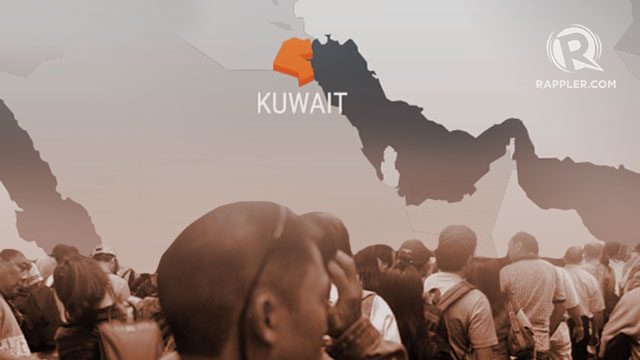SUMMARY
This is AI generated summarization, which may have errors. For context, always refer to the full article.

MANILA, Philippines – Experts on migration and overseas recruitment were divided on the government’s decision to suspend the deployment of overseas Filipino workers (OFWs) to Kuwait on Friday, January 19.
Following the deaths of 7 OFWs in Kuwait, Department of Labor and Employment (DOLE) Secretary Silvestre Bello III ordered an OFW deployment ban to the Gulf state.
It came after President Rodrigo Duterte himself said he was a mulling a “total ban” on deployment to Kuwait after being informed of cases of sexual abuse of Filipino domestic workers.
LBS Recruitment Solutions Corporation President and ethical recruitment advocate Lito Soriano expressed support for the deployment ban and urged Bello to conduct a bilateral meeting with the labor minister of Kuwait to craft a “domestic worker-focused agreement that will promote the rights and welfare of both our domestic workers and their employer.”
He added that the agreement should improve the recruitment procedures, deploy an accessible 24/7 online assistance center in Manila and Kuwait, provide capacity training to both Manila and Kuwait recruiters in handling welfare concerns of domestic workers, as well as education on dispute avoidance, resolution, and settlements.
Migrant rights advocate and the head of the Blas F. Ople Policy Center Susan Ople meanwhile thanked the President “for shining the spotlight on the continuous stream of welfare cases and tragic deaths involving OFWs in Kuwait.”
“We hope that DOLE and the DFA will also look at the plight of our overseas domestic workers across Asia and the Middle East with the goal of improved protection and better reintegration programs,” she added in a statement.
Ople also urged the two agencies to hold a joint consultation meeting specifically on the situation of domestic workers overseas.
“The number of women leaving to work abroad as domestic workers continue to increase. We need to do what we can to ensure their safety and protection from recruitment to onsite legal and welfare assistance,” she added.
Ople added that there has always been a succession of welfare cases, suicides, and complaints of contract violations in Kuwait.
“While a lot of our OFWs are indeed happy in Kuwait, we still need to look at why the embassy shelter is always full of women seeking refuge and safety,” she said.
More vulnerable
Not everyone, however, is supportive of the deployment ban.
Recruitment and migration expert Emmanuel Geslani said that it will only increase the number of Filipino victims of human traffickers and illegal recruiters, who are still “very active in the country.”
“The illegal recruitment syndicates continue to operate in the country due to the very high price they receive from foreign recruitment agencies in Dubai and Lebanon. Anywhere from $5,000 to 7,500, which the household worker will pay to her employer eventually,” Geslani said.
Geslani said that in 2014, the government’s suspension of the deployment of domestic workers to the United Arab Emirates didn’t stop Filipinos from going there in visit visas and being trafficked into working as domestic workers.
The same happened in Lebanon, he said, where HSWs kept arriving despite a deployment ban imposed in 2007.
Amanda Araneta, President of Philippine Association of Accredited Agencies to Kuwait (PHILAAK), also said that the deployment ban will not stop domestic workers from coming to Kuwait.
According to her statement coursed through Geslani, the recent deaths in Kuwait referred to by the president in his speech on Thursday were “not due to domestic violence or hardship,” but were accidental.
“In two cases, it was suffocation of the maids who were using charcoal heaters in their rooms due to the very cold winter, (while) one was a case of a love triangle. The last one was a suicide of (a) worker related to a comedian Tekla,” she said in a statement.
Araneta instead recommended a dialogue between DFA and Kuwait labor officials on the stricter implementation of labor laws concerning Filipino citizens and their employers. – Rappler.com
Add a comment
How does this make you feel?
There are no comments yet. Add your comment to start the conversation.